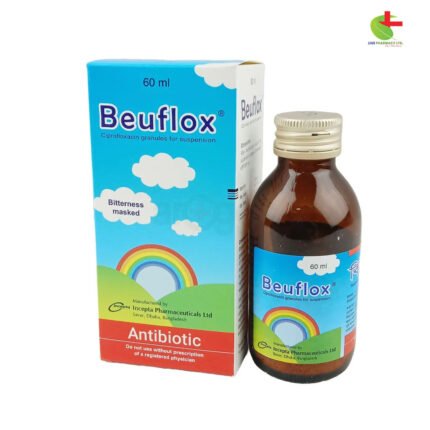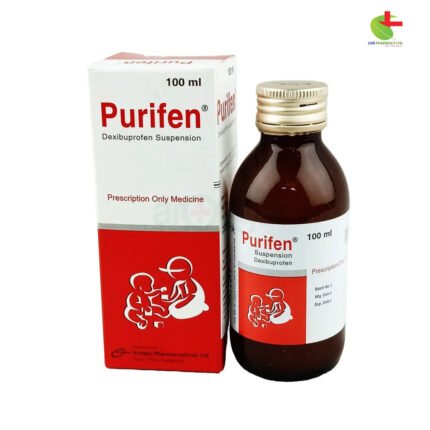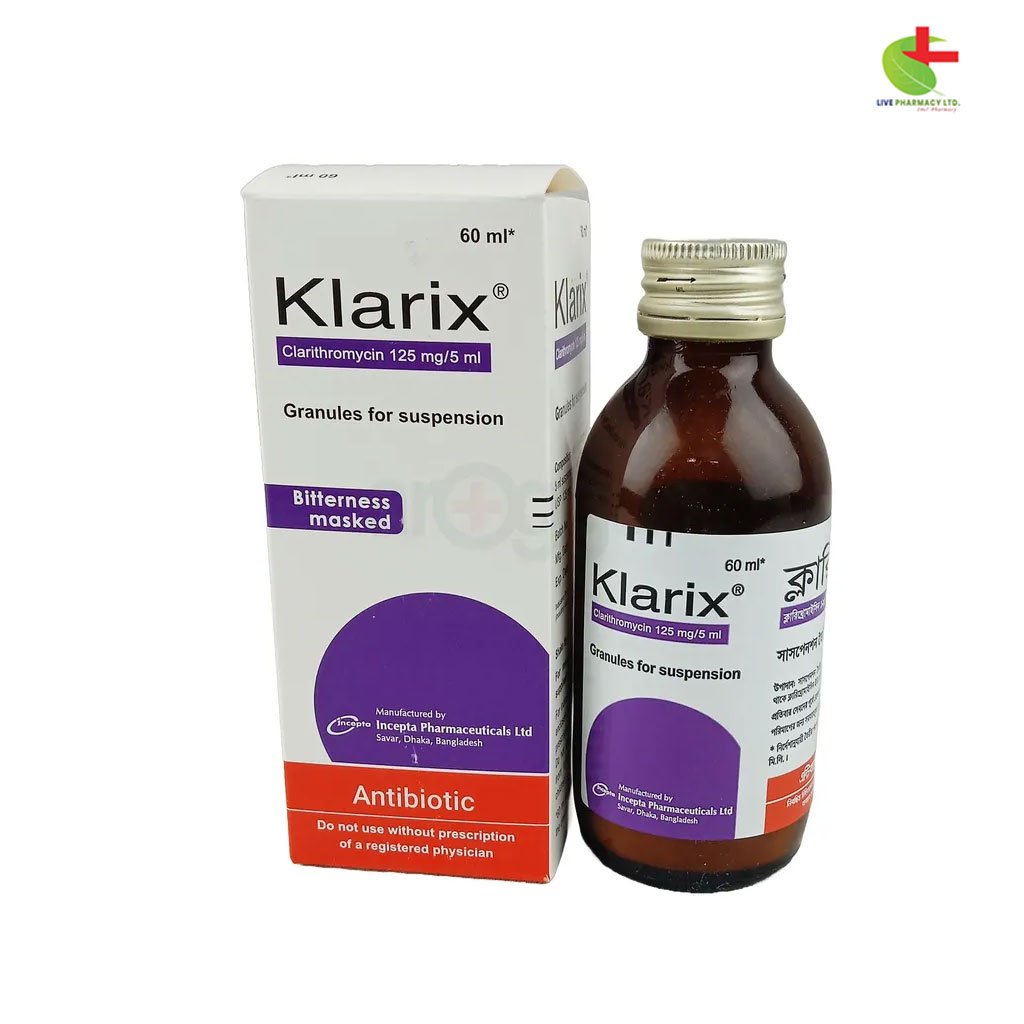

Klarix Suspension
395.00৳ Bottle (60ml)
- Klarix is an effective macrolide antibiotic indicated for treating various bacterial infections, including acute bacterial exacerbation of chronic bronchitis, sinusitis, and pneumonia.
- It inhibits protein synthesis in susceptible bacteria, providing an advantage over similar antibiotics.
- Recommended dosages vary by condition and patient age, with careful consideration for those with renal or hepatic impairments.
- Common side effects include gastrointestinal disturbances and allergic reactions, while precautions are necessary for patients with specific health conditions.
 Brand
Brand
|
Incepta Pharmaceuticals Ltd |
|---|---|
 Generics
Generics
|
Clarithromycin |
 Type
Type
|
Powder for Suspension |
Indications
Klarix is prescribed for the treatment of:
- Acute Bacterial Exacerbation of Chronic Bronchitis in adults
- Acute Maxillary Sinusitis
- Community-Acquired Pneumonia
- Pharyngitis or Tonsillitis
- Uncomplicated Skin and Skin Structure Infections
- Acute Otitis Media in pediatric patients
- Treatment and Prophylaxis of Disseminated Mycobacterial Infections
- Helicobacter Pylori Infection and Duodenal Ulcer Disease in adults
Always use Klarix under the guidance of a registered healthcare professional.
Pharmacology
Clarithromycin functions by inhibiting protein synthesis in susceptible bacteria. It primarily binds to the donor site on the 50S subunit of the bacterial ribosome, thereby preventing translocation. This antibiotic is effective against most Gram-positive bacteria, Chlamydia, and some Gram-negative bacteria, as well as Mycoplasmas. Clarithromycin demonstrates equal or greater efficacy than Erythromycin against many Gram-positive organisms. It is also more acid-stable and generally better tolerated than Erythromycin. Clarithromycin exhibits double the effectiveness of Erythromycin against Haemophilus influenzae, though many Gram-negative species show resistance due to insufficient drug penetration.
Dosage & Administration
Adults:
- Acute Bacterial Exacerbation of Chronic Bronchitis: 250 mg to 500 mg every 12 hours for 7 to 14 days.
- Acute Maxillary Sinusitis: 500 mg every 12 hours for 14 days.
- Community-Acquired Pneumonia: 250 mg every 12 hours for 7 to 14 days.
- Pharyngitis or Tonsillitis: 250 mg every 12 hours for 10 days.
- Uncomplicated Skin and Skin Structure Infections: 250 mg every 12 hours for 7 to 14 days.
- Treatment and Prophylaxis of Disseminated Mycobacterium Avium Disease: 500 mg every 12 hours until the patient is deemed at low risk for dissemination.
H. pylori Infection Combination Dosing:
- Triple Therapy: Clarithromycin/Lansoprazole/Amoxicillin: 500 mg clarithromycin, 30 mg lansoprazole, and 1 g amoxicillin, all administered every 12 hours for 10 to 14 days.
- Triple Therapy: Clarithromycin/Omeprazole/Amoxicillin: 500 mg clarithromycin, 20 mg omeprazole, and 1 g amoxicillin, all given every 12 hours for 10 to 14 days. If an ulcer is present, additional omeprazole (20 mg once daily) is recommended for 14 to 18 days for healing and symptom relief.
- Dual Therapy: Clarithromycin/Omeprazole: 500 mg clarithromycin every 8 hours and 40 mg omeprazole once daily for 14 days. An extra 14 days of omeprazole (20 mg once daily) is recommended for ulcer healing and symptom relief.
Children: The recommended daily dosage is 15 mg/kg/day divided every 12 hours for 10 days. For treating and preventing mycobacterial infections, the dose is 7.5 mg/kg every 12 hours, not exceeding 500 mg.
Renal and Hepatic Impairment: Clarithromycin is primarily metabolized by the liver and excreted through the kidneys. In patients with hepatic impairment and normal renal function, no dosage adjustment is necessary. However, in cases of severe renal impairment (with or without hepatic impairment), dosage reduction or extended dosing intervals may be warranted.
Always use Klarix under the guidance of a registered healthcare professional.
Interaction
Klarix is contraindicated with certain medications, including HMG-CoA reductase inhibitors (e.g., lovastatin, simvastatin), gastroprokinetic agents (e.g., cisapride), ergot alkaloids (e.g., ergotamine, dihydroergotamine), antipsychotics (e.g., pimozide, quetiapine), and anti-gout agents (e.g., colchicine). It is also not recommended to use Klarix with antiarrhythmic medications (e.g., disopyramide, quinidine, dofetilide, amiodarone, sotalol, and procainamide).
Contraindications
Clarithromycin should not be administered to individuals with known hypersensitivity to clarithromycin, erythromycin, any macrolide antibiotics, or any other components of this product. It is also contraindicated in patients with a history of cholestatic jaundice or hepatic dysfunction related to prior clarithromycin use.
Side Effects
Klarix is generally well tolerated, but some side effects may occur, including nausea, vomiting, diarrhea, and abdominal pain. Other reported effects include stomatitis, glossitis, headache, allergic reactions (ranging from mild skin reactions to anaphylaxis), and taste disturbances. Additionally, transient central nervous system effects such as anxiety, dizziness, insomnia, and hallucinations have been noted.
Pregnancy & Lactation
Klarix may be administered to neonates and children at appropriate doses. However, breastfeeding mothers should refrain from giving breast milk to infants until treatment is complete. The safety of Klarix during pregnancy is not well established, so it is not recommended.
Precautions & Warnings
Klarix should be discontinued if severe hypersensitivity reactions occur. It should be avoided in patients with known QT prolongation or those taking drugs that prolong the QT interval, as well as in cases of ventricular arrhythmia, hypokalemia, hypomagnesemia, or significant bradycardia. Discontinuation is necessary if hepatitis symptoms arise. There is an elevated risk of all-cause mortality in patients with coronary artery disease one year or more post-treatment, necessitating a careful assessment of potential risks versus benefits. If diarrhea occurs, evaluate for Clostridium difficile-associated diarrhea (CDAD). Exacerbation of myasthenia gravis has also been reported in patients receiving Klarix.
Use in Special Populations
Children and Adolescents: Klarix has been established as safe and effective for treating pharyngitis, tonsillitis, community-acquired pneumonia, acute maxillary sinusitis, acute otitis media, and uncomplicated skin infections in pediatric patients aged 6 months and older. It is also effective in preventing disseminated Mycobacterium avium complex disease in pediatric patients aged 20 months and older with advanced HIV. Safety in patients under 20 months of age with MAC has not been studied, nor has it been established for those under 6 months.
Overdose Effects
Ingestion of large quantities of Klarix may lead to gastrointestinal symptoms. In one case, a patient with a history of bipolar disorder ingested 8 grams and exhibited altered mental status, paranoid behavior, hypokalemia, and hypoxemia. Treatment for overdose includes the prompt elimination of unabsorbed drug and supportive measures. Hemodialysis or peritoneal dialysis is unlikely to significantly affect Klarix serum levels.
Therapeutic Class
Macrolides
Storage Conditions
Store Klarix in a cool, dry place, away from light and moisture. Once reconstituted, the suspension should be used within 7 days at room temperature or 14 days when refrigerated. Keep out of reach of children.











Reviews
There are no reviews yet.